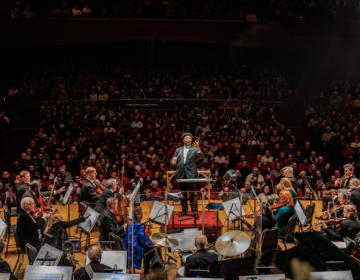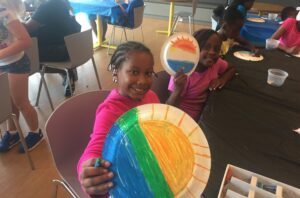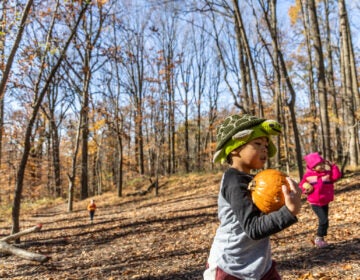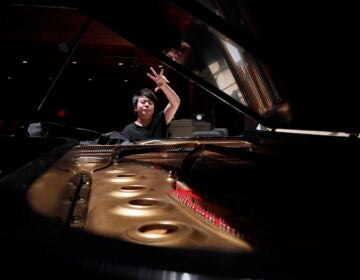Play On Philly is shaping students’ futures through intensive music education
Research shows participation in the program sets up students for success by strengthening their executive functions.
From Philly and the Pa. suburbs to South Jersey and Delaware, what would you like WHYY News to cover? Let us know!
On a late May afternoon, orchestral music filled the Temple Performing Arts Center’s concert hall while attentive audience members immersed themselves in intricate melodies.
It was POP Jubilee, the annual show by the students and alumni of Play On Philly, or POP. The organization, founded in 2011, provides intensive music education to students in pre-K to 12th grade at five different city locations. “Abbott Elementary” creator and star Quinta Brunson recently honored Play On Philly by donating $25,000.
At the May annual concert, friends and family beamed with pride as they watched pre-school to 12th-grade students showcase what they learned in the approximately eight hours per week of music practice in the past school year. The audience was also treated to the world premiere of a new composition.
The young artists are passionate about their music education, but the program teaches them more than just learning to play an instrument, said Jessica Zweig, POP’s executive director.
Zweig said the program emphasizes strengthening children’s executive function, which she describes as the “air traffic controller of your brain.”
“It’s this set of cognitive skills that are learned and practiced,” she said. “And so it’s like the skill of persisting on a task for a long period of time. It’s the skill of being able to hold multiple things in your brain at once and prioritize them.”
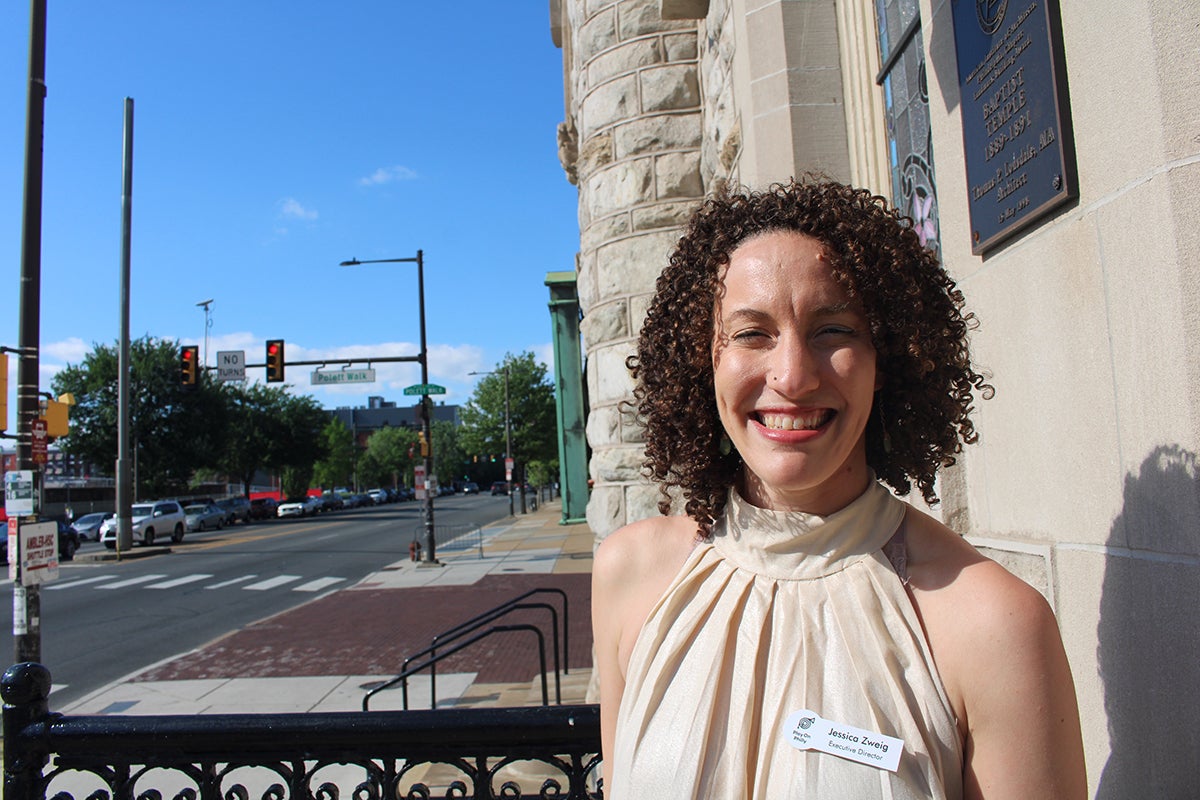
Play On Philly students also learn how to share and cooperate with others during their group and ensemble lessons.
All of those social and emotional skills are key, Zweig said, but teachers and program leaders and administrators don’t lose sight of the mission at hand: to teach music.
“I believe that everybody deserves access to beauty and to, you know, this very life-changing thing that happens when you learn to play an instrument,” she said.
Students in the program come from a range of socioeconomic backgrounds, Zweig said. Many kids can count on full family support, while others might be dealing with more difficult circumstances. Either way, she said, POP provides a supportive, nurturing, trauma-informed environment.
“Learning an instrument is really hard, and when we put an instrument in the kid’s hand and we say, we’re going to stick with you, not just one time … but year over year over year, day over day, week over week, month over month, we’re saying that we believe in you and that we’re going to stick with you, even though this thing is hard, right? And so we’re also saying to kids who you know, particularly, have had adverse childhood experiences that you know you’re not good at it now, but you’re going to get there,” she said.
Zweig said research by West Chester University’s Research on Education and the Arts in Childhood, or REACH, Lab shows that the music education provided by Play On Philly reinforces and strengthens those skills, although how exactly that happens is still a question.

Strengthening executive functions
Steven Holochwost, co-director of the REACH lab and an associate professor in the Department of Psychology at Lehman College and the City University of New York, started studying the impact of POP’s programs on students’ executive functioning in 2014.
He said the lab’s goal is to “understand the impacts of arts education and arts experiences on children, with an emphasis on children from underserved backgrounds,” and to help “expand access to those arts education and arts experiences.”
Over the past decade, the lab found that students in Play On Philly outperform their peers on a number of measures of executive function, Holochwost said.
Students in Play On Philly also performed better “on multiple measures of academic achievement in math and English language arts than their peers,” he said.
Holochwost said researchers are still unsure exactly how music education strengthens executive functions, but these programs provide “a context,” he said, for exercising a lot of executive functions.
Researchers think there may be a connection to repetitive practice and discipline of an instrument and inhibitory control, which is the ability to inhibit a dominant behavioral response and delay gratification. Students at POP regularly engage this skill by practicing their instruments. They have to work with an ensemble and learn how to be a team player. They also have to constantly shift their attention from the conductor, to their music, to the rest of the ensemble, another skill that is key to executive functioning, Holochwost said.
No matter how POP strengthens executive functions, Holochwost said, many studies have documented how the impact of improved executive functions can be long-lasting.
“If you look at things like academic achievement when you’re in school … there’s a strong relationship there,” he said. “If you look at executive functions in the beginning of high school or late middle school, they’re quite predictive of whether somebody graduates from high school.”

Zweig said POP students’ experience attests to this idea of persistence and continuity: Every student who has stuck with POP through 12th grade, Zweig said, has graduated high school and attended college.
Holochwost said better executive functions in adults also correlate to career achievement and happiness in relationships.
“A person who, whether it’s a kid or an adult, who’s able to manage their their thoughts and their feelings and their behaviors, and particularly, to do so in a way that allows them to kind of advance their goals, whatever those goals might be, that is a person who’s going to on, on balance do better in life,” he said.
Holochwost said the format of POP is a significant part of its impact.
“I don’t know that if kids had gotten the program once a week instead of every day after school, we would have seen the same effects,” he said. “ I think one of the key things about Play On Philly’s program is the dosage, basically, for lack of a better term.”
As much as the program has documented tangible impacts on students’ academic performance in other subjects, Holochwost said focus should still remain on teaching kids how to play orchestral music.
“We have these expectations for arts programs that basically, oh, well, they’re gonna teach kids about music, sure, but they’re also gonna make kids better at math,” he said. “I mean, we don’t ever expect a math class to make kids better at the oboe, right? It would be absurd if I said, ‘Well, the way I’m going to evaluate the effectiveness of this math class is whether kids get better at music, right?’ You’d be like that doesn’t make any sense, but that’s exactly what we do when we often evaluate music education programs.”
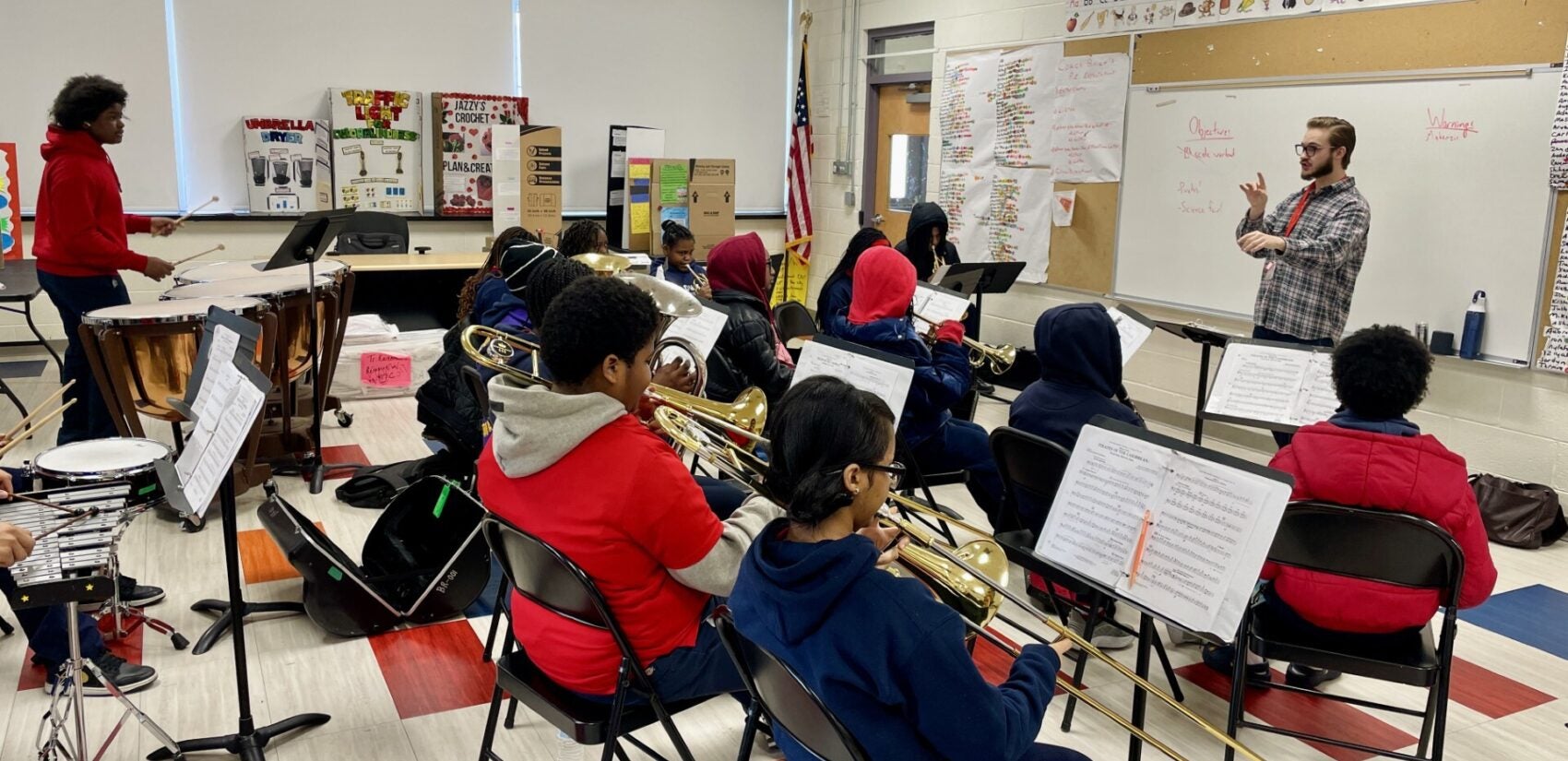
‘I bring value to this orchestra’
For Gabrielle Bioteau, 24, and Christina Rooks, 23, the skills they learned and confidence they built participating in the POP program as high school students continue to bolster them in their careers now.
Bioteau now works as an engineer at PECO. She said joining POP helped her confront her impostor syndrome and taught her how to value her own unique contributions — a lesson she still carries with her into the workplace now.
“It took me some time to realize that I bring value to this orchestra, right?” Bioteau said. “Even though I play saxophone, it’s not a common orchestral instrument, I was able to find my way through music and really grow into myself. And I think now that I’m working full-time, keeping that lesson with me, that I bring value to this company, even though I’m new, even though I’m still building up my technical skills.”

Rooks, a trombone player, still uses her music skills in the classroom as a special education aide at Valley Forge Elementary School. She said her experience at POP inspired her to get a bachelor’s degree in music and enter the education field.
“I want other kids to have that experience that I had, and it was just the compassion that the teachers had for me, and the ambition and the drive that they allowed us to maintain, really just made me realize every generation should have this opportunity,” Rooks said.
Bioteau said POP has also inspired her to embrace diversity, equity and inclusion in her professional life and engage in community outreach.
“I think POP is very much in the realm of diversity, equity and inclusion,” she said. “So that kind of sparked that passion for me, and it’s something that I continue to do at work through employee research groups and volunteering. … That personal value is a lesson that I take with me into my professional life.”
Both alumni said they want to stay involved in the program going forward. At the concert on May 19, they joined POP students onstage to play in the ensemble.
“I’m just excited to continue to watch the alumni program grow and just see what the students end up doing after they graduate,” Bioteau said. “Because we know that music education isn’t solely just learning how to play an instrument. We are learning valuable skills. We’re meeting our lifelong friends, and those skills help in whatever field these students end up going into, so I’m super excited to continue to see them grow.”
Rooks agreed with Bioteau.
“It’s beneficial for the kids to see that even if your pathway isn’t necessarily just strictly music, this still has an impact on you as you go throughout your life,” she said.
Rooks said she would like to see Play On Philly expand throughout the region over the next 15 years.
“There are so many other different areas in Pennsylvania alone that could really benefit from programs like this,” she said. “I’m just thinking of how POP could be beneficial to my school and then other schools.”
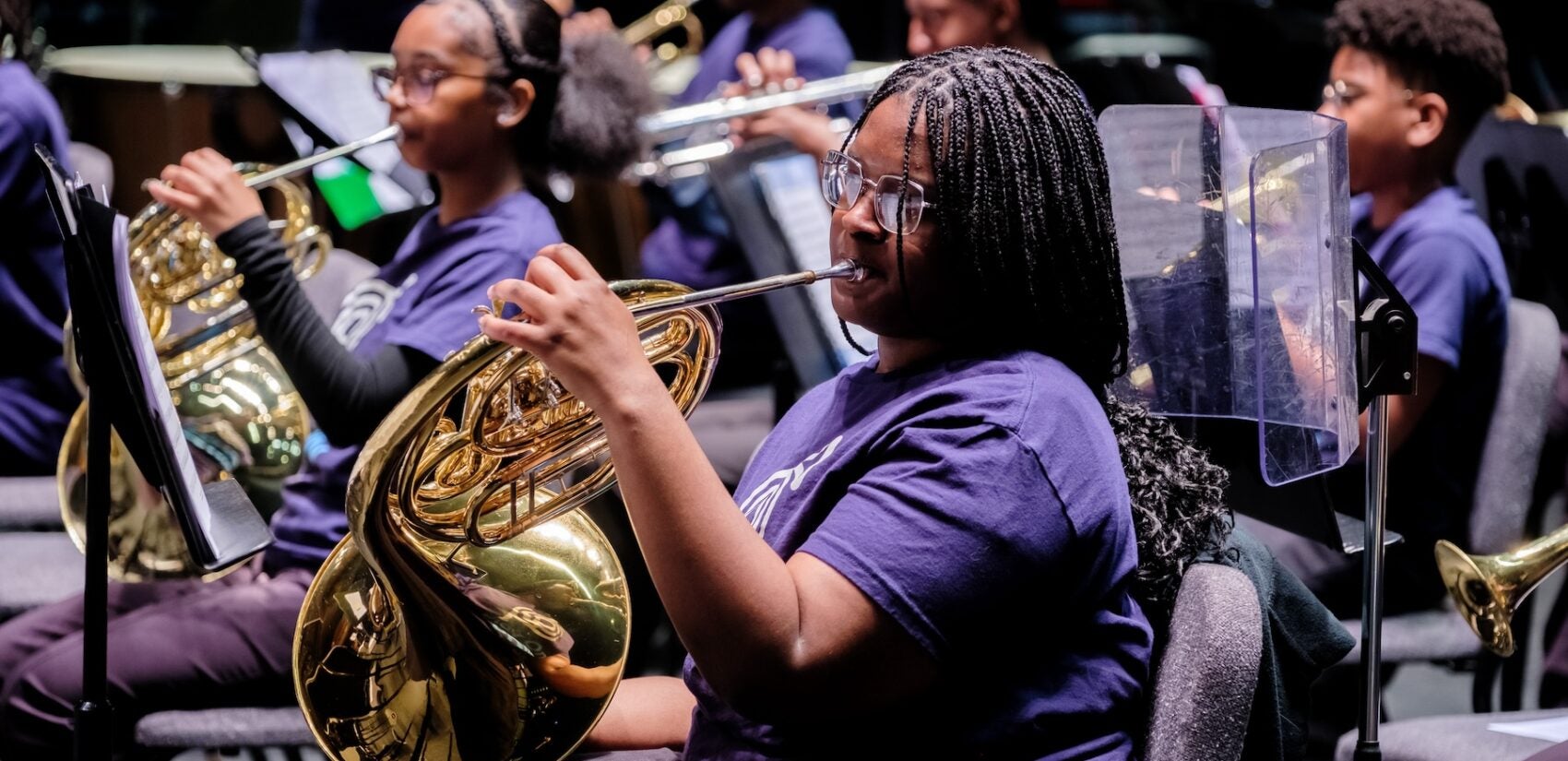
Community impact
Zweig said the next piece of the program’s growth could include expanding engagement with the community and measuring that impact beyond the classroom.
“We’re working right now to put some programming in place to really move some of our family programming forward, which speaks to some of the broader community,” she said. “We’re in four different schools, and I think that, particularly for our K to 8 schools, they really think of themselves as Play On Philly schools…they are a school with music in it, that their kids know how to play music, and they take a lot of pride in that.
Her “dream,” Zweig said, would be to envision a community rallying around a local POP orchestra in the same way that they might cheer on the high school football team.
“Everybody, whether you know a kid or not, everybody seems to come out for that football game and rallies around those kids in this really beautiful way,” she said. “And what if that were the same for an orchestra of young people playing instruments, and that local churches and local community organizations all knew that these kids were sort of the the pride and joy of that community, and came out in support of them, whether it was their first concert that they ever played on their little screechy violin, or whether they’d been playing for 12 years, and the community had sort of seen them grow up around it. But 15 years in, we’re still kind of a baby in that way.”
Zweig said music, in particular, is a creative discipline that can have a community-wide impact.
“Creativity, you know, I think you always think of the mad artist who goes into his studio and just paints and comes out with a Jackson Pollock,” she said. “That’s one type of creativity, but there’s another type of creativity in just going at a problem with five other people and saying, ‘What are the crazy, wild ways that we could solve this challenge?’ Or, ‘How could we make our community more beautiful than we found it, and how can we engage all of the people around us to do that?’ I think that there is inherent creativity in asking and answering those questions.”
Asking those questions together can have an impact, she said.
“I think our world, we’re in a very strange place, and it’s going to take a lot of creative solutions to get out of it,” she said. “And finding solutions, not alone but with others, is a very brave and creative practice.”
Editor’s Note: This story is part of a series that explores the impact of creativity on student learning and success. WHYY and this series are supported by the Marrazzo Family Foundation, a foundation focused on fostering creativity in Philadelphia youth, which is led by Ellie and Jeffrey Marrazzo. WHYY News produces independent, fact-based news content for audiences in Greater Philadelphia, Delaware and South Jersey.


Get daily updates from WHYY News!
WHYY is your source for fact-based, in-depth journalism and information. As a nonprofit organization, we rely on financial support from readers like you. Please give today.



